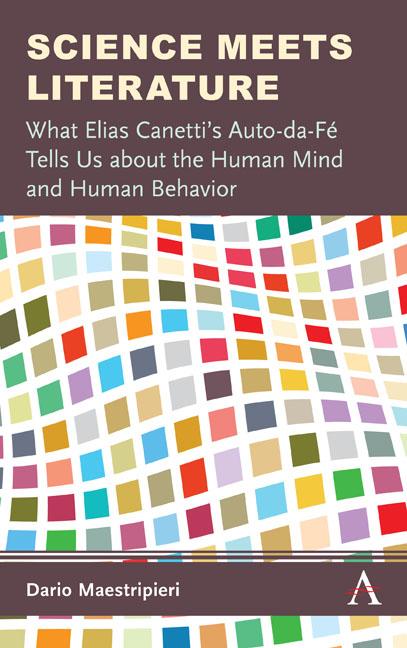 Science Meets Literature
Science Meets Literature Book contents
- Frontmatter
- Contents
- Preface
- Acknowledgments
- Chapter One Why Science and Literature?
- Chapter Two Elias Canetti: A Visionary Literary Genius on a Quest to Understand Human Nature
- Chapter Three The Plot of Auto-da-Fé
- Chapter Four Auto-da-Fé Is a Novel about Human Nature
- Chapter Five Major Themes Running Through Auto-da-Fé
- Chapter Six Analysis of Part I: A Head Without a World
- Chapter Seven Analysis of Part II: Headless World
- Chapter Eight Analysis of Part III: The World in the Head
- Chapter Nine Narrative Strategies in Auto-da-Fé
- Chapter Ten Consilience, the Canetti Way
- Elias Canetti: Chronology
- References
- Index
- Frontmatter
- Contents
- Preface
- Acknowledgments
- Chapter One Why Science and Literature?
- Chapter Two Elias Canetti: A Visionary Literary Genius on a Quest to Understand Human Nature
- Chapter Three The Plot of Auto-da-Fé
- Chapter Four Auto-da-Fé Is a Novel about Human Nature
- Chapter Five Major Themes Running Through Auto-da-Fé
- Chapter Six Analysis of Part I: A Head Without a World
- Chapter Seven Analysis of Part II: Headless World
- Chapter Eight Analysis of Part III: The World in the Head
- Chapter Nine Narrative Strategies in Auto-da-Fé
- Chapter Ten Consilience, the Canetti Way
- Elias Canetti: Chronology
- References
- Index
Summary
Happiness is … to be able to pursue all of your interests simultaneously, according to a Seinfeld episode in which George Costanza wishes he could do his favorite activities— eat, watch TV, and have sex— all at the same time. My search for happiness is what prompted me to write a book in which I simultaneously pursue my interest in the science of human behavior and my passion for literature.
The first time I read Elias Canetti's novel Auto-da-Fé I was a college student in Italy. I can't tell how good or bad the Italian translation was relative to the German original, but it must have been good enough for me to be struck by the extraordinary quality of Canetti's prose. It's stylistically rigorous and sophisticated, original, witty, energetic, playful, erudite, and a lot more. The way Auto-da-Fé is written is so striking and unique that a literary scholar, Harriet Murphy, had developed a theory and written a whole book about it (Murphy 1997). Canetti's prose is particularly congenial to my taste for writing. If I were a writer of literary fiction, my goal would be to write like Canetti. But my interest in Auto-da-Fé is not just a matter of literary taste. For me, reading a piece of literary fiction (or admiring any work of art) is always about making a connection with the mind of the person who created it. If I recognize that I have some affinities with the writer, it's likely that I will find his work interesting (but having affinities with writers is neither necessary nor sufficient for me to like their work). With my first reading of Auto-da-Fé, there was definitely the perception on my part of some deep affinities with the author. Here is a writer, I thought, who values intelligence, knowledge, culture, literary craftsmanship, clear rational thinking, ambition, and commitment but who is also playful, witty, has a great sense of humor, and knows how to use irony. Although I suspected that Canetti had something new and important to say with Auto-da-Fé, at the time of my first reading I wasn't sure what that was. Clearly, the novel resonated with me in many different ways but it wasn't clear to me exactly how or why.
- Type
- Chapter
- Information
- Science Meets LiteratureWhat Elias Canetti's Auto-da-Fé Tells Us about the Human Mind and Human Behavior, pp. vii - xPublisher: Anthem PressPrint publication year: 2019


